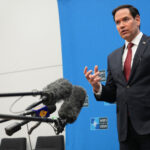Israeli sources: Lebanon cease-fire deal to include direct U.S. involvement
The U.S. will lead a monitoring mechanism, according to a diplomatic source, that would give Israel ‘legitimacy and support to act to remove the threat if there’s a violation.'

Ramiz Dallah/Anadolu via Getty Images
NABATIEH, LEBANON - SEPTEMBER 28: Smoke rises from the impact sites near a settlement following the Israeli army's attack in Khiam town of Nabatieh, Lebanon on September 28, 2024. (Photo by Ramiz Dallah/Anadolu via Getty Images)
The Lebanon cease-fire deal taking shape in Jerusalem and Washington would include direct American involvement in monitoring to ensure that Hezbollah does not re-arm itself in southern Lebanon, Israeli sources with knowledge of the matter told Jewish Insider this week.
“The Americans and Israel mostly see eye-to-eye on reaching a diplomatic agreement in Lebanon that will totally remove the threat to residents of northern Israel,” a defense source said.
The U.S. will lead a monitoring mechanism, according to a diplomatic source, that would give Israel “legitimacy and support to act to remove the threat if there’s a violation [by Hezbollah].”
There will be both technological and human monitoring, the source said.
Other countries that agreed to be involved in maintaining the cease-fire include the U.K. and France, according to Israeli sources. The United Nations Interim Force in Lebanon would continue to take part, as well, despite Israeli concerns over the U.N. force’s ineffectiveness in preventing Hezbollah from arming.
The White House declined to comment on the negotiations and possible American involvement.
A spokesperson for the French Embassy in Israel said that “France would indeed be ready to play a role in monitoring a cease-fire agreement in Lebanon, provided that such agreement is concluded. The nature of the monitoring will depend on the content of the agreement.”
Moscow will also play a role in ensuring weapons are not smuggled over Lebanon’s border with Syria, where Russia has a large military presence, but an Israeli defense source said that is “one element [of the plan], but not a central one in any way.”
Israeli sources emphasized that the Lebanese government has not yet accepted the deal, and that its military will have to “stand up for its sovereignty against Hezbollah.” Lebanon has thus far opposed giving the IDF the ability to enter Lebanon if Hezbollah violates the agreement — an element of the deal that Israel sees as non-negotiable.
“Is there any sane person who believes that we will agree to a settlement or a solution that serves Israel’s interests at the expense of Lebanon’s interests and sovereignty?” Lebanon’s parliament speaker, Nabih Berri, a supporter of Hezbollah, said on Tuesday, according to The Washington Post.
The terms of the still-incomplete deal would be based on U.N. Security Council Resolution 1701, which ended the Second Lebanon War in 2006. The resolution called for “an area free of any armed personnel, assets and weapons other than those of the Government of Lebanon and of UNIFIL” between the Israel-Lebanon border and the Litani River, some 17 miles north. It also “authorizes UNIFIL to take all necessary action … to ensure that its area of operations is not utilized for hostile activities of any kind.” However, as evidenced by the thousands of rockets, missiles and drones launched by Hezbollah at Israel since Oct. 8, 2023, UNIFIL has been incapable of enforcing the terms of the resolution.
Over 60,000 Israelis remain evacuated from northern Israel, which faces daily attacks by Hezbollah.
President-elect Donald Trump gave his approval of the deal as it currently stands when Israeli Strategic Affairs Minister Ron Dermer visited Mar-a-Lago earlier this week, two Israeli sources confirmed. A spokesman for Dermer had no comment.
“[Trump] wants to finish wars, and he wants the war to end with [the Biden administration],” one source said.
An Israeli official told The Washington Post that an agreement to end the war in Lebanon would be a “gift” for Trump.
Israeli Prime Minister Benjamin Netanyahu and Trump have spoken on the phone three times since the U.S. presidential election last week. Netanyahu said that they will work “to further strengthen the alliance between Israel and the U.S. … We also see great opportunities for Israel in expanding peace.”
The IDF announced that it was expanding its ground operation in southern Lebanon, clearing out arms depots and uncovering rocket launchers pointed at northern Israel on Thursday.
The IDF released the names of six Israeli soldiers killed in a firefight with Hezbollah on Wednesday, in one of the heaviest losses in one day since Israel began its ground operation against Hezbollah in southern Lebanon in September: Cpt. Itay Marcovich, 22, from Kohav Ya’ir, Staff Sgt. Sraya Elboim, 21, from Mehola, Staff Sgt. Dror Hen, 20, from Gan Haim, Staff Sgt. Nir Gofer, 20, from Dimona, Sgt. Shalev Itzhak Sagron, 21, from Sderot, and Sgt. Yoav Daniel, 19, from Nahariya. More than 40 soldiers have been killed in Lebanon since Oct. 1.
Jewish Insider Senior National Correspondent Gabby Deutch contributed to this report.

















































